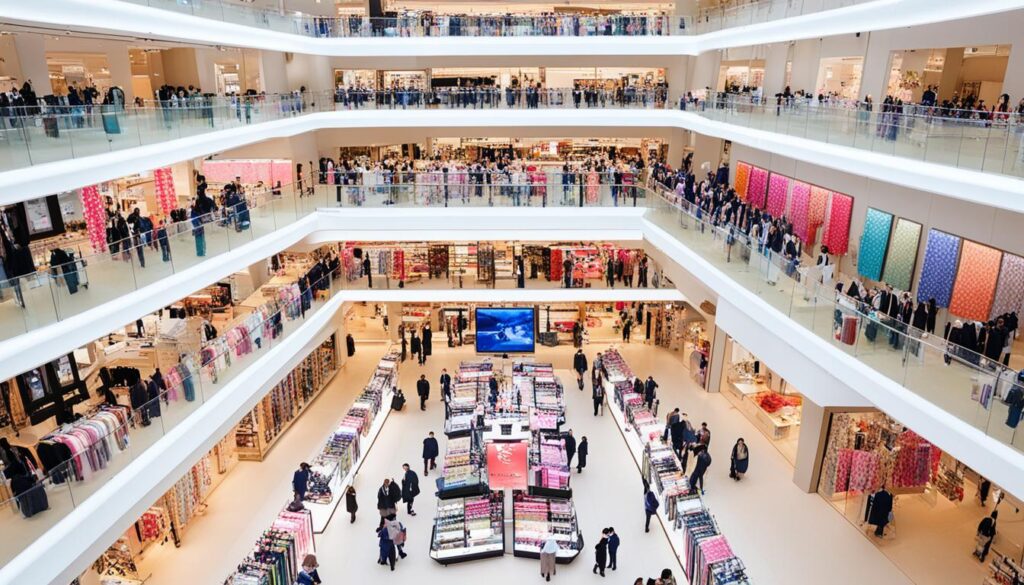Department stores in Japan, known as “depāto,” are an integral part of the country’s rich cultural landscape. These multi-story retail establishments offer a unique shopping experience that combines tradition and modernity, making them a must-visit destination for both locals and tourists alike.
When it comes to department stores in Japan, Tokyo is home to some of the most renowned and iconic ones. These establishments not only provide a wide range of high-quality products but also showcase the fusion of Japanese craftsmanship and international luxury brands.
From fashion to food, cosmetics to lifestyle goods, Japanese department stores offer an extensive selection of products across different levels. Each floor is dedicated to specific categories, ensuring a seamless shopping experience that caters to all your needs.
Join us as we dive deeper into the meaning and grammar of department store in Japanese, explore its pronunciation, and understand its cultural significance in Japanese society.
The Concept of Japanese Department Stores
Japanese department stores offer a unique shopping experience with their organized levels and diverse product offerings. Each floor is dedicated to different departments, catering to a wide range of interests and preferences.
The basement floor of Japanese department stores is a paradise for food lovers, housing a variety of Japanese delicacies and sweets. Here, you can indulge in the finest local and international flavors, from traditional snacks to gourmet treats.
On the ground level, you’ll find the cosmetics department, showcasing an array of renowned international and local beauty brands. Whether you’re looking for skincare products or the latest makeup trends, you’re sure to find a wide selection of high-quality options to choose from.
As you make your way up the levels, you’ll discover a world of fashion, sports, lifestyle goods, stationery, and toys. The upper levels house an extensive collection of women’s and men’s fashion, allowing you to explore the latest trends and styles from both international and Japanese designers.
Additionally, department stores feature dedicated sections for sports enthusiasts, offering a range of sporting goods and equipment. Whether you’re into fitness, outdoor activities, or team sports, you’ll find everything you need to pursue your passions.
On the top level of many department stores, you’ll find a delightful selection of restaurants serving a variety of Japanese and international cuisines. These culinary havens provide the perfect opportunity to take a break from shopping and experience the flavors of Japan and the world.
Some Japanese department stores even boast rooftop gardens that can be transformed into beer gardens during the summer months. These serene and picturesque settings provide a relaxing atmosphere where you can unwind and enjoy refreshing beverages with friends and family.
Experience the enticing journey through the levels of a Japanese department store, where each floor offers a new adventure and an abundance of treasures waiting to be discovered.
The Shopping Experience at Japanese Department Stores
Japanese department stores are renowned for their exceptional customer service. Upon entering, you’ll be greeted by neatly dressed staff who line up to welcome customers with bows and greetings. Elevator girls, although their numbers have decreased, provide information and assist customers as the elevator moves between levels. The presentation of goods is impeccable, especially when purchased as gifts. They are beautifully packaged and often placed in carriers bearing the department store’s name, highlighting their reputable source.
Department stores in Japan usually operate from 10 am to 8 pm, with restaurants opening later and closing later at night. They are open on weekends and holidays, while some may be closed on certain weekdays or in January.
Experience the impeccable service and exceptional offerings at department stores in Japan, where every visit feels like a special occasion.
| Exceptional Customer Service | Impeccable Presentation | Convenient Operating Hours |
|---|---|---|
| Neatly dressed staff who greet customers with bows and greetings | Goods beautifully packaged and placed in carriers bearing the department store’s name | Open on weekends and holidays, with extended hours for restaurants |
| Elevator girls assist customers and provide information | Some stores may be closed on certain weekdays or in January |
Where to Find Japanese Department Stores
Major cities in Japan, including Tokyo, are home to numerous department stores. These stores are typically located in city centers or near large train stations, making them easily accessible to both locals and tourists. The bustling city of Tokyo, in particular, boasts a wide variety of department stores offering an unparalleled shopping experience.
Some of the most well-known department store chains that can be found across Japan include:
| Department Store Chain | Locations |
|---|---|
| Isetan-Mitsukoshi | Tokyo, Osaka, Kyoto, Hiroshima, and more |
| Takashimaya | Tokyo, Yokohama, Kyoto, Osaka, and more |
| Daimaru-Matsuzakaya | Tokyo, Kyoto, Osaka, and more |
In addition to these nationwide chains, there are also regional and city-specific department stores that cater to local tastes and preferences. These stores often have a strong connection to the community and offer unique products and experiences.
It is worth noting that many department stores in Japan share the same parent company as railway companies, further emphasizing their central location and convenience for shoppers. This integration of transportation and retail makes department stores a popular destination for both locals and tourists.

With their strategic locations and diverse offerings, Japanese department stores are a must-visit for anyone looking to immerse themselves in the vibrant shopping culture of Japan.
The History of Department Stores in Japan
Department stores in Japan have a rich history that traces back to the Edo period. Originally catering to the affluent class, these stores emerged from luxurious kimono shops. As Japan embraced international trade and Western influence during the Meiji period, department stores began incorporating Western elements and goods into their offerings.
Western department stores introduced innovative merchandising techniques and revolutionized the concept of a comprehensive shopping experience that combined retail, dining, and socializing. However, Japanese department stores retained their distinct identity by integrating traditional crafts and products alongside Western brands, showcasing their commitment to preserving cultural heritage.
Today, Japanese department stores provide a unique fusion of Western and Japanese influences, offering a diverse range of products and experiences to shoppers.
The Evolution of Japanese Department Stores
| Period | Key Developments |
|---|---|
| Edo Period (1603-1868) | Department stores originated from luxury kimono shops. |
| Meiji Period (1868-1912) | Introduction of Western influence and incorporation of Western goods. |
| Modern Era | Continued integration of traditional crafts alongside Western brands. |
The Unique Offerings at Japanese Department Stores
When it comes to shopping in Japan, the best department stores in Tokyo offer an unparalleled experience with their unique offerings. These establishments showcase a wide range of products, catering to diverse tastes and preferences.
One of the highlights of shopping at Japanese department stores is the selection of high-end designer clothing. Fashion enthusiasts can explore the latest trends from both renowned international brands and local Japanese designers. From elegant dresses to stylish suits, these stores have everything you need to elevate your wardrobe.
In addition to clothing, department stores in Japan also excel in offering exquisite jewelry and accessories. Whether you’re looking for a statement necklace, a pair of elegant earrings, or a luxury handbag, you’ll find a wide selection to choose from. The quality craftsmanship and attention to detail make these accessories stand out.
Japanese department stores are also renowned for their cosmetics departments. Here, you’ll find a plethora of beauty products from top international brands as well as popular Japanese beauty labels. From skincare essentials to luxurious makeup, these departments cater to all your beauty needs.
What sets Japanese department stores apart is their ability to showcase traditional Japanese crafts and goods alongside international luxury brands. Visitors can indulge in the artistry of handcrafted objects such as kimonos, pottery, kitchenware, and furniture. These items embody the rich cultural heritage of Japan and make for unique souvenirs or gifts.
Furthermore, many department stores in Japan have dedicated sections for traditional Japanese sweets. These sections are a treat for both the eyes and taste buds. You can admire the intricate artistry that goes into creating these delicacies while enjoying their delectable flavors.
Overall, department stores in Japan offer a perfect blend of Western and Japanese offerings, making them a must-visit destination for a truly immersive shopping experience. Whether you’re a fashion enthusiast, a lover of traditional crafts, or a food connoisseur, these stores have something for everyone.
Indulge in the unique offerings at Japanese department stores and discover a world of luxury, craftsmanship, and culinary delights.
The Role of Department Stores in Japanese Craft Culture
Japanese department stores play a significant role in preserving and promoting Japanese craft culture. Unlike their Western counterparts, Japanese department stores actively support and sell contemporary handmade goods crafted by Japanese artisans. This reflects Japan’s historical emphasis on merchant ethics and the integration of traditional customs in modern retail spaces. Department stores serve as retail-supported craft museums, showcasing the creativity and skill of Japanese artisans and providing a platform for them to reach a wider audience.
In a Japanese department store, you’ll find dedicated sections that house a vast array of exquisite handmade products, from pottery and textiles to lacquerware and woodworking. These departments often collaborate with local artisans and craftsmen to curate unique collections that highlight traditional craftsmanship and showcase contemporary interpretations of traditional techniques. By offering a space for artisans to sell their creations, department stores contribute to the preservation of Japan’s rich craft heritage.
The emphasis on supporting local craftsmanship extends to luxury department stores in Japan. These upscale retailers not only offer high-end international brands but also feature exclusive collaborations and limited-edition products created by renowned Japanese artisans. This allows designers and artisans to gain recognition and generate income while introducing their work to a discerning international audience.
The role of Japanese department stores in promoting craft culture extends beyond the physical retail space. Many department stores organize craft exhibitions, workshops, and demonstrations to educate and engage the public. These events provide opportunities for customers to learn about traditional techniques directly from artisans and gain a deeper appreciation for the time, skill, and dedication required to create these exquisite pieces.
Additionally, department stores in Japan actively support young and emerging artisans by creating platforms for them to showcase their talents. Through competitions and mentorship programs, department stores foster the growth of the next generation of Japanese craft artisans, ensuring the continuity and evolution of traditional craft techniques.
In summary, Japanese department stores play a crucial role in preserving, promoting, and commercializing Japanese craft culture. By providing a retail-supported craft museum experience, showcasing the work of established and emerging artisans, and collaborating with local craftspeople, these department stores contribute to the vibrant and thriving craft scene in Japan.
The Future of Japanese Department Stores
Japanese department stores have faced challenges in recent years due to economic factors and increased competition. However, they continue to adapt and reinvent themselves to stay relevant in the ever-changing retail landscape. One strategy that some department stores have embraced is allocating space to private tenants, diversifying their offerings to attract a broader customer base.
Despite the challenges, Japanese department stores hold a special place in Japanese culture and remain an essential part of the shopping experience in Japan. With their rich history and unique products, they offer shoppers a distinct and memorable experience. The exceptional customer service provided by department stores further enhances the overall shopping experience, making it even more enjoyable and personalized.
In the future, we can expect a further blending of traditional Japanese crafts and international brands within Japanese department stores. This fusion will create a dynamic and diverse shopping environment that appeals to both local customers and international visitors. The integration of traditional Japanese crafts will continue to showcase the country’s artistic heritage while allowing for a wider range of products, ensuring that the department stores remain a must-visit destination for shopping in Japan.

